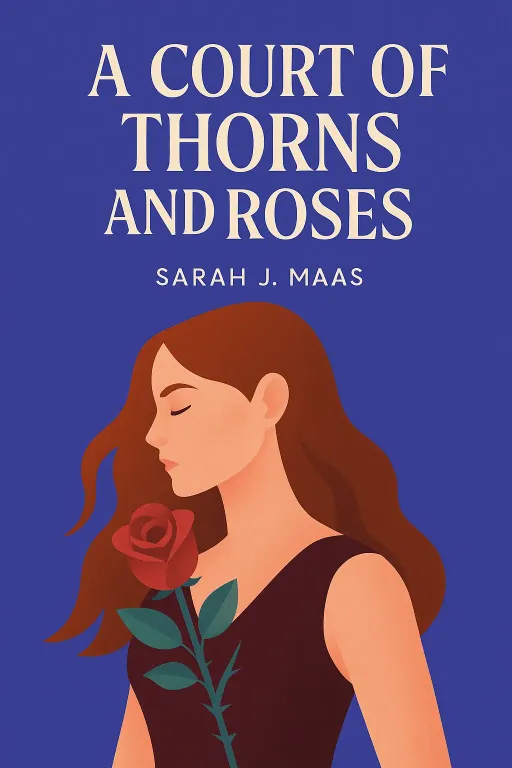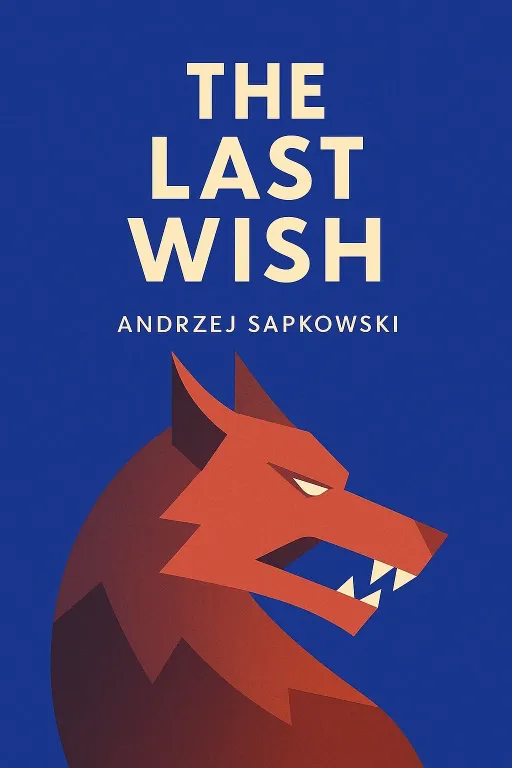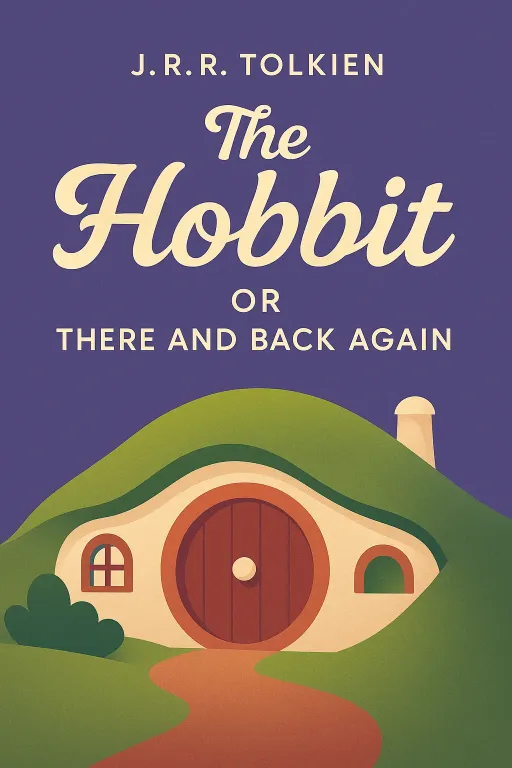
ACOTAR: Thorns, Roses & Red Flags
12 minGolden Hook & Introduction
SECTION
Daniel: Alright Sophia, give me your one-sentence, brutally honest review of A Court of Thorns and Roses. Sophia: Oh, that's easy. It's 'Beauty and the Beast' if Belle had a bow and arrow and the Beast had some serious anger management issues that we're supposed to find romantic. Daniel: (Laughs) That is... startlingly accurate. And it perfectly sets the stage for what we're diving into today: the global phenomenon that is A Court of Thorns and Roses by Sarah J. Maas. This is the book that essentially lit the fuse on the entire "romantasy" genre as we know it today. Sophia: It's everywhere. You can't walk into a bookstore without seeing that cover. Daniel: Absolutely. And what's fascinating about Sarah J. Maas is that she's not an overnight success. She started writing her first major series, Throne of Glass, when she was just sixteen, publishing it chapter by chapter on an online fiction platform. She built a massive following from the ground up, which I think really informs the kind of fan-centric, genre-blending stories she tells. Sophia: That makes a lot of sense. It feels like a book written by someone who genuinely loves the tropes but also wants to break them. Daniel: Exactly. And that 'Beauty and the Beast' setup you mentioned is precisely where this story kicks off, but with a much darker, more desperate twist right from page one.
The Gilded Cage: Survival, Deception, and the Faerie Bargain
SECTION
Daniel: So, forget a quaint village and a quirky inventor father. We start with our protagonist, nineteen-year-old Feyre Archeron, in the dead of a brutal winter. Her family has lost its fortune, her father is useless, and her sisters are bitter. She is the sole provider, and they are days away from starving to death. Sophia: Wow, so right from the start, it's not a simple 'good vs. evil' situation. She's in pure survival mode. Daniel: Pure survival. She's out hunting in the woods, a place mortals are terrified of because it borders Prythian, the faerie lands. She’s tracking a doe when a massive wolf, unnaturally large, appears and also starts stalking the deer. Feyre has a choice: let the wolf take her only chance at food, or take a huge risk. Sophia: And she takes the risk. Daniel: She does. She remembers old legends that faeries are vulnerable to ash wood, and she happens to have one precious, expensive ash arrow. Believing this giant wolf might be a fae in disguise, she makes a calculated decision. She kills the wolf to secure the deer for her family. It's not a moment of heroism; it's a cold, pragmatic choice to keep her family alive for another week. Sophia: That's a powerful way to start. She's not a passive princess waiting in a castle. She's a huntress who makes a morally gray, lethal decision. Daniel: And that decision has immediate consequences. A few days later, a terrifying, monstrous beast smashes down the door of their cottage. This beast is a High Fae, and he's here for retribution. He invokes an ancient Treaty between humans and faeries. Sophia: Let me guess: "a life for a life." Daniel: Exactly. The wolf she killed was no ordinary animal; it was one of his own, a faerie named Andras. The Treaty demands a human life in exchange. To save her family from being slaughtered, Feyre volunteers herself. Sophia: So she trades her life for theirs. This is where the 'Beauty and the Beast' part really kicks in, right? She's taken to his castle. Daniel: Correct. But this is where Maas starts subverting the trope. Feyre is taken across the wall into Prythian, to the Spring Court. And it's not a dark, gloomy castle. It's breathtakingly beautiful, an eternal spring filled with flowers, art, and endless food. She's given a luxurious room and fine clothes. Sophia: But it's a gilded cage. I remember feeling so much tension in these early chapters. It's beautiful, but it's wrong. Everyone is wearing these ornate, jeweled masks that they can't take off. The servants are there, but they're... off. And no one will give her a straight answer about anything. Daniel: That's the core of the deception. The beast, who we learn is named Tamlin, is the High Lord of the Spring Court. But his court is empty, his lands are afflicted by a mysterious blight that's weakening their magic, and he and his entire court are trapped by a curse. Feyre is living in this beautiful, opulent prison, but she's surrounded by secrets and unspoken danger. The servant, Alis, warns her not to trust anyone, not to eat the food, to always keep her wits about her. Sophia: It's so unsettling. The luxury is a form of control. She has everything she could ever want physically, but she has zero information and zero real freedom. The glamour of the place is just hiding this deep, dark sickness. And that sickness, that curse, is really the heart of the story.
Thorns and All: Unmasking Love, Power, and a Hidden War
SECTION
Sophia: This is where the story gets really complicated and, honestly, where a lot of the reader debate comes in. Let's talk about Tamlin. Is he a romantic hero or a walking red flag? Daniel: That is the million-dollar question, and it’s what makes the book so polarizing and compelling. On one hand, Tamlin shows Feyre a world of beauty she's never known. He's gentle with her, he recognizes her artistic soul and gives her a gallery full of paints, he takes her to a magical pool of starlight to heal her spirit. He's trying to break through the hardened shell she's built up from years of just surviving. Sophia: I see that, but I also see the possessiveness. He has a terrifying temper. The Calanmai ritual in Chapter 22 is a major turning point for many readers. He's taken over by this primal magic, and he finds Feyre, bites her, and is furious that she wasn't available for him to claim for the rite. It's aggressive and deeply uncomfortable. Daniel: It is. And later, when he perceives a threat, his first instinct is to lock her away, to control her movements "for her own safety." This is where the book has faced a lot of criticism. It's hugely popular, but many readers and critics point to these moments as examples of toxic masculinity disguised as romantic protection. It raises the question: where is the line between being protective and being controlling? Sophia: And the book doesn't give you an easy answer. It just throws another, even more complicated character into the mix to blow everything up. Let's talk about Rhysand. Daniel: The High Lord of the Night Court. His entrance changes everything. He storms into the Spring Court unannounced, and the atmosphere immediately curdles. He's arrogant, cruel, and powerful in a way that makes Tamlin seem almost weak in comparison. He humiliates Tamlin and his friend Lucien, and he gets inside Feyre's head, literally. Sophia: He's terrifying. But he's also the first person who seems to be telling a version of the truth. He mocks Tamlin for hiding behind his flowers while the world is falling apart. He hints that there's a much bigger game being played, one that Tamlin is losing. His arrival shatters the fragile fairy-tale illusion that Feyre was starting to believe in. Daniel: Exactly. Rhysand's presence forces Feyre to see that Tamlin's "protection" is actually a symptom of his powerlessness against the real threat: a fae queen named Amarantha. And this realization fuels Feyre's own agency. She stops waiting for Tamlin to fix things. She starts seeking answers herself. She cleverly gets information from Lucien on how to trap a Suriel—an ancient, all-knowing faerie—to learn about the blight. She even starts trying to teach herself to read to decipher the secrets of the court. Sophia: She's not waiting to be rescued anymore. She's realizing that if anyone is going to break this curse, it might have to be her. She's moving from survivor to active player.
Under the Mountain: The Ultimate Trial of Love and Agency
SECTION
Daniel: And that agency is put to the ultimate test when Tamlin, believing he's protecting her, sends her back to the human world. He breaks her heart, telling her he doesn't love her, all to get her away from the danger he knows is coming. Sophia: Which is another one of those classic controlling-hero moves. "I'm hurting you for your own good." But Feyre doesn't accept it. Daniel: Not for long. She returns to her family, who are now mysteriously wealthy thanks to Tamlin's secret intervention. But she's miserable. She feels hollowed out. Then she learns a horrifying truth: a family she knew was murdered, and she suspects it's connected to a name she gave Rhysand. She realizes the danger isn't just in Prythian; it's spilling over. And she makes a choice. She goes back. Sophia: She chooses to go back into the fire. That's a huge moment for her character. Daniel: It is. She returns to the Spring Court to find it in ruins. Everyone is gone. The servant Alis is the only one left, and she finally tells Feyre the whole truth. The blight, the masks, the curse—it's all the work of Amarantha, a cruel fae general who conquered Prythian 50 years ago. She cursed Tamlin and his court: they would all wear masks until Tamlin could find a human girl who hated faeries enough to kill one, and then make that same girl fall in love with him and declare it. Sophia: Wow. So the entire 'Beauty and the Beast' setup was a desperate, last-ditch effort to break an impossible curse. Daniel: An impossible curse with a time limit. And time just ran out. Amarantha has taken Tamlin and his entire court to her own realm, a place of horror called 'Under the Mountain.' And Feyre, a mortal human, decides to go after them. Sophia: This is where the book goes from a dark romance to a full-blown high-stakes fantasy thriller. The trials Under the Mountain are brutal. Daniel: They are. Amarantha makes a deal with Feyre. She has to complete three deadly tasks, or solve a riddle, and Tamlin and his court will be freed. The first trial is a giant, flesh-eating worm in a labyrinth. The second is a deadly trap that preys on her illiteracy. But it's the third trial that is the true test. Sophia: The final choice. It’s so devastating. Amarantha presents her with three hooded, anonymous faeries and a dagger. She tells Feyre she has to kill one of them to save everyone. And then reveals that one of them is Tamlin. Daniel: She has to kill the man she loves to prove she loves him. It's the ultimate cruel paradox. And in that moment, Feyre has a flash of insight. She remembers a stray comment Lucien made months ago: "For someone with a heart of stone, yours is certainly soft these days." Sophia: The riddle! The answer to Amarantha's riddle is 'love.' But she also realizes the clue about his heart. Daniel: Yes. She realizes it's not just a metaphor. Amarantha literally gave him a heart of stone so he couldn't love anyone. Trusting this, Feyre stabs Tamlin through the chest. It's an act of ultimate faith and a redefinition of love—not as passive affection, but as an active, intelligent, and courageous choice. Sophia: And in doing so, she solves the riddle. But Amarantha, in her rage, snaps Feyre's neck. She dies. Daniel: She dies. But as the curse breaks, the combined power of all the High Lords of Prythian flows back. In a final act, they use that magic to resurrect Feyre, bringing her back not as a human, but as a powerful High Fae. It's a complete death and rebirth. She sacrifices her humanity and is reborn as something more, having saved the entire realm not by being a damsel, but by being a warrior.
Synthesis & Takeaways
SECTION
Sophia: So, when you strip it all away, what is this book really about? Is it just a spicy fairy tale? Daniel: I think it's about the deconstruction of fairy tales. It takes the 'love conquers all' trope and says, 'Yes, but that love has to be active, intelligent, and sometimes brutal.' It's not about waiting for a prince to save you. It's about recognizing that the prince might be just as trapped as you are, and that true freedom comes from your own agency. Sophia: The book suggests that real love isn't about being protected in a gilded cage. It's about having the strength to walk into the darkness with someone, or for someone, and face the monsters together. Daniel: Exactly. It's about becoming powerful enough to save the kingdom yourself, even if it costs you everything. The story has resonated so deeply with millions because it takes these familiar fantasy and romance structures and injects them with very modern questions about power, consent, and what it means to be truly strong. Sophia: It definitely makes you wonder, what parts of our own 'fairy tales' about life and love need a little deconstruction? What cages, even gilded ones, are we accepting without question? Daniel: A powerful thought to end on. And it's a question that has sparked endless debate among fans. We'd love to hear your take—do you see Tamlin as a romantic hero or a cautionary tale? Let us know your thoughts on our social channels. We love seeing the discussion continue. Daniel: This is Aibrary, signing off.

